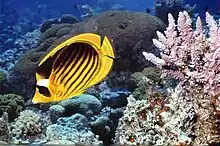Diagonal butterflyfish
The diagonal butterflyfish (Chaetodon fasciatus), also known as the Red Sea raccoon butterflyfish, is a species of marine ray-finned fish, a butterflyfish belonging to the family Chaetodontidae. It is found in the Red Sea and western Indian Ocean.[2]
| Diagonal butterflyfish | |
|---|---|
 | |
| Scientific classification | |
| Domain: | Eukaryota |
| Kingdom: | Animalia |
| Phylum: | Chordata |
| Class: | Actinopterygii |
| Order: | Perciformes |
| Family: | Chaetodontidae |
| Genus: | Chaetodon |
| Subgenus: | Chaetodon (Rabdophorus) |
| Species: | C. fasciatus |
| Binomial name | |
| Chaetodon fasciatus Forsskål, 1775 | |
| Synonyms[2] | |
Description
The diagonal butterflyfish has a yellow body marked with 11 diagonal stripes. On the head there is a vertical black band through the eye and an incomplete white band on the forehead. The dorsal, anal, and caudal fins are yellow.[3] This species attains a maximum total length of 22 centimetres (8.7 in).[2]
Distribution
The diagonal butterflyfish is found in the northwestern Indian Ocean. It has been recorded from the Red Sea and the Gulf of Aden south as far as Kenya.[1]
Habitat and biology
Diagonal butterflyfish are found over and around corals, on which they feed.[4] They have also been observed feeding on gelatinous zooplankton, such as jellyfish (Scyphozoa) and comb jellies (Ctenophora).[5]
Systematics
The diagonal butterflyfish was first formally described in 1775 by the Swedish speaking Finnish born naturalist Peter Forsskål (1732-1763) with the type locality given as Jeddah. [6] It belongs to the large subgenus Rabdophorus which might warrant recognition as a distinct genus. In this group, its closest relative is probably the very similar common raccoon butterflyfish (C. lunula). Other close relatives appear to be the black butterflyfish (C. flavirostris), Philippine butterflyfish (C. adiergastos), and perhaps also the unusual red-tailed butterflyfish (C. collare). Although the coloration of this group varies quite a lot, they are all largish butterflyfishes with an oval outline, and most have a pattern of ascending oblique stripes on the flanks. Except in the red-tailed butterflyfish, there is at least a vestigial form of the "raccoon" mask, with a white space between the dark crown and eye areas.[7][8]
Footnotes
- Myers, R.F.; Pratchett, M. (2010). "Chaetodon fasciatus". IUCN Red List of Threatened Species. 2010: e.T165705A6096997. doi:10.2305/IUCN.UK.2010-4.RLTS.T165705A6096997.en. Retrieved 19 November 2021.
- Froese, Rainer; Pauly, Daniel (eds.) (2019). "Chaetodon fasciatus" in FishBase. December 2019 version.
- "Chaetodon fasciatus". Saltcorner. Bob Goemans. 2012. Retrieved 22 December 2020.
- Siliotti, A. (2002). Fishes of the Red Sea. Geodia, Verona. ISBN 88-87177-42-2.
- Bos A.R.; Cruz-Rivera E. & Sanad A.M. (2016). "Herbivorous fishes Siganus rivulatus (Siganidae) and Zebrasoma desjardinii (Acanthuridae) feed on Ctenophora and Scyphozoa in the Red Sea". Marine Biodiversity. doi:10.1007/s12526-016-0454-9.
- Eschmeyer, William N.; Fricke, Ron & van der Laan, Richard (eds.). "Species in the genus Chaetodon". Catalog of Fishes. California Academy of Sciences. Retrieved 21 December 2020.
- Fessler, Jennifer L.; Westneat, Mark W (2007). "Molecular phylogenetics of the butterflyfishes (Chaetodontidae): Taxonomy and biogeography of a global coral reef fish family". Molecular Phylogenetics and Evolution. 45 (1): 50–68. doi:10.1016/j.ympev.2007.05.018.
- Hsu, Kui-Ching; Chen, Jeng-Ping & Shao, Kwang-Tsao (2007). "Molecular phylogeny of Chaetodon (Teleostei: Chaetodontidae) in the Indo-West Pacific: evolution in geminate species pairs and species groups" (PDF). Raffles Bulletin of Zoology Supplement. 14: 77–86. "Archived copy" (PDF). Archived from the original (PDF) on 2007-08-11. Retrieved 2008-09-02.
{{cite web}}: CS1 maint: archived copy as title (link)
External links
- Photos of Diagonal butterflyfish on Sealife Collection
